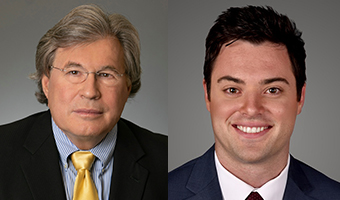Provider Strategy
Purchasing a DME Supplier Business
What are the potential kickback pitfalls, and how do you avoid them?
- By Jeffrey S. Baird, Matthew D. Earl
- Dec 01, 2021
 A recent Department of Justice press release discusses
an enforcement action by the DOJ against Bayada Home Health that
was resolved with the payment of $17 million by Bayada.
According to the press release, a lawsuit based on the False Claims
Act (FCA) arose as a result of the acquisition by Bayada of home health
agencies (HHAs) from an unnamed seller. According to the press release
and settlement agreement, the seller continued to operate retirement
communities.
A recent Department of Justice press release discusses
an enforcement action by the DOJ against Bayada Home Health that
was resolved with the payment of $17 million by Bayada.
According to the press release, a lawsuit based on the False Claims
Act (FCA) arose as a result of the acquisition by Bayada of home health
agencies (HHAs) from an unnamed seller. According to the press release
and settlement agreement, the seller continued to operate retirement
communities.
Although details of the transaction are unavailable, if the acquisition
was structured in a manner that rewarded the seller for future referrals
of individuals from the retirement communities to the HHAs purchased
by Bayada, then kickback issues would arise.
Generally, transactions between entities negotiating at arm’s length
do not attract attention from the DOJ. Therefore, the structure of the
Bayada acquisition may have contained problematic provisions that
drew the scrutiny of the DOJ. Problematic provisions can include (i)
a purchase price in excess of fair market value or (ii) a portion of the
purchase price being paid out over time and tied to the number of
future referrals.
Other Enforcement Actions
According to other DOJ press releases, recent enforcement actions
against parties to a transaction include:
Prime Healthcare Services (Prime). Prime allegedly paid kickbacks
by overpaying for a physician’s practice and surgery center because
Prime wanted the physician to refer patients to Prime’s Desert Valley
Hospital in Victorville, Calif. The DOJ contended that the acquisition
violated the federal anti-kickback statute (AKS) because (i) the price
paid by Prime took into account the volume and/or value of the physician’s
referrals to Prime’s Desert Valley Hospital, (ii) the purchase price
exceeded fair market value, and (iii) the acquisition and immediate
closure of the surgery center was not commercially reasonable.
DaVita. According to the DOJ, DaVita would offer a targeted physician
or physician group a lucrative opportunity to enter into a joint
venture involving DaVita’s acquisition of an interest in dialysis clinics
owned by the physicians, or DaVita’s sale of an interest in its dialysis
clinics to the physicians. To make the transaction financially attractive
to potential physician partners, the DOJ contended that DaVita would
manipulate the financial models used to value the transaction. According
to the DOJ, these manipulations resulted in physicians paying less
for their interest in the joint ventures and realizing returns on investment
that were extraordinarily high.
Quality Improvement Benefits
Office of Inspector General guidance closest to being on point is a
1992 letter from D. McCarty Thornton, Associate General Counsel for
the OIG. The letter discusses potential kickback issues arising from a hospital (or entity that owned a hospital) purchasing a physician group:
Frequently, hospitals seek to purchase physician practices as a means to
retain existing referrals or to attract new referrals of patients to the hospital.
Such purchases implicate the anti-kickback statute because the remuneration
paid for the practice can constitute illegal remuneration to induce the
referral of business reimbursed by the Medicare or Medicaid programs.
Specific items that we believe would raise a question as to whether
payment was being made for the value of a referral stream would include,
among other things:
- payment for goodwill,
- payment for value of ongoing business unit,
- payment for covenants not to compete,
- payment for exclusive dealing agreements,
- payment for patient lists, or
- payment for patient records.
Payments for the above types of assets or items are questionable where
there is a continuing relationship between the buyer and the seller and the
buyer relies (at least in part) on referrals from the seller.
We believe a very revealing inquiry would be to compare the financial
welfare of the physicians involved before and after the acquisition … If the
economic position of these physicians is expected to significantly improve as a
result of the acquisition, it is likely that a purpose of the acquisition is to offer
remuneration for the referrals which these physicians can make to the buyer.
In a follow-up letter that clarified its position, the OIG acknowledged
that payments for intangible assets are not “per se illegal,” but it maintained
that they must be scrutinized, and made the point that how the
parties characterize such payments “is not determinative” of whether
they are, in fact, being made in exchange for referrals.
Conclusion
While asset purchases normally present low kickback risk, it is important
that the valuation of the assets be commercially reasonable.
Warning signs in a transaction that indicate the need for special caution
are (i) questionable valuations of intangible assets, (ii) a seller that will
remain in business to some degree and, therefore, be able to refer patients
to the buyer, and (iii) instances where commercial reasonableness
may be difficult to objectively assess.
This article originally appeared in the Nov/Dec 2021 issue of HME Business.
About the Authors
Jeffrey S. Baird, Esq., is Chairman of the Health Care Group at Brown & Fortunato, a law firm with a national health care practice based in Texas. He represents HME companies, pharmacies, infusion companies, manufacturers and other health care providers throughout the United States. Baird is Board Certified in Health Law by the Texas Board of Legal Specialization and can be reached at (806) 345-6320 or [email protected].
Matthew D. Earl, Esq. is an attorney with the Health Care Group, and can be reached at (806) 345-6360 or [email protected].